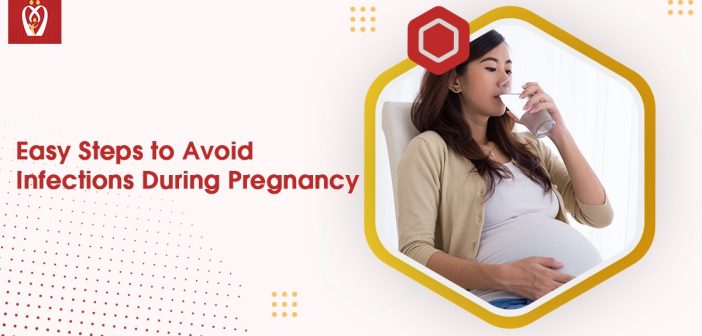Infections can harm both you and your baby during pregnancy, hence the right pregnancy care is important. Thankfully, by taking a few extra measures during pregnancy care and making healthy choices, you can increase the odds that your baby will be born healthy.
Here are some things you can take to protect yourself and your baby against infections during pregnancy care
Maintain a healthy level of hygiene
Hands should be washed frequently, especially if you’re around or caring for children as a part of pregnancy care.
Hand washing regularly, especially before and after certain activities, is one of the most effective strategies to eliminate germs, avoid being sick, and avoid diseases. Handwashing is especially vital before and after specific activities, such as going to the restroom, handling food, or blowing your nose. If soap and running water aren’t accessible, an alcohol-based hand sanitiser gel can be used instead.
Cook your meat until it is thoroughly cooked
There should be no pink within, and the juices should stream clean. Ground meat should be cooked to a minimum of 160 degrees Fahrenheit (71 degrees Celsius). Cook poultry until it reaches a temperature of 165 degrees Fahrenheit (74 degrees Celsius). Other meats, such as beef and pork, should be cooked to a minimum of 145°F (63°C) and rested for several minutes afterwards. Reheat hot dogs, luncheon meats, and deli meats until they boil before eating.
Listeria monocytogenes, a dangerous pathogen, may be present in certain undercooked and processed meats. Avoid raw (unpasteurised) milk and products produced with it. Soft cheeses like feta, brie, and queso fresco should only be consumed if they are labelled as being prepared from pasteurised milk. Products that have not been pasteurised (raw) may contain dangerous bacteria.
Inquire about Group B streptococcus with your doctor (GBS)
This type of bacteria is carried by about one out of every four women, yet they do not get sick. If you have this type of bacterium, a simple swab test will reveal it near the end of your pregnancy. If you have a GBS infection, talk to your doctor about how to keep your baby safe as a part of pregnancy care. Second, consult your physician about vaccines. Some immunisations are indicated before conception, during pregnancy care, and immediately after delivery. Having the appropriate vaccines as a part of pregnancy care at the proper times will help you stay healthy. For example, the flu vaccine is crucial when you’re pregnant.
Vaccinations can also help prevent your child from being ill or developing long-term health issues. Third, obtain a sexually transmitted infection (STI) test (STIs). Some patients with STIs do not feel ill or show any signs or symptoms. When you’re pregnant, it’s critical to know whether you have an STI when you’re pregnant since it can have significant consequences for both you and your baby. If you test positive for an STI, talk to your doctor about how you and your baby can be protected. Some sexually transmitted infections (STIs) can be treated while you’re pregnant. To avoid STIs, be sure you’re following safe sex practices. People who have a condition should be avoided. This is especially true in cases of chickenpox or rubella.
Rubella can cause severe birth defects and put you at risk for miscarriage or stillbirth. Chickenpox can cause pregnancy complications and birth defects; rubella can cause severe birth defects and put you at risk for miscarriage or stillbirth. If you haven’t had these infections or didn’t get the vaccine(s) before becoming pregnant, stay away from anyone who has them. Wearing a mask, avoiding crowds, and practising social distancing are advised precautions to take during the COVID-19 pandemic. In addition, protect yourself from insects that are known to transmit diseases.
Infected mosquitos can spread viruses such as the Zika virus, which has been linked to birth abnormalities in children. Tick bites can also transfer infections like Lyme disease, which, if left untreated, can cause pregnancy difficulties. When mosquitoes and ticks are active, stay outside in long-sleeved shirts and long pants.
Use insect repellents approved by the Environmental Protection Agency (EPA) that contain one of the active chemicals DEET, picaridin, IR3535, or oil of lemon eucalyptus (para-menthane-3,8-diol). Avoid going to places where you and your baby could get infected. Avoid contact with possibly contaminated soil and do not touch or change soiled cat litter. Instead, allow someone else to handle it. If you have to change the litter yourself, wear gloves and wash your hands afterwards.
Dirty cat litter and dirt may carry a parasite that causes toxoplasmosis, a disease caused by a parasite. Keep wild or pet rats, lizards, and turtles, as well as their droppings, away. Pests in or near your home should be removed by a pest control professional. If you have a pet rodent, such as a hamster or guinea pig, entrust it to someone else until your kid arrives. A dangerous virus called the lymphocytic choriomeningitis virus may be carried by some rats (LCMV).
If you include this tips in your pregnancy care, you will be able to prevent infections that could harm you and your developing baby. Sometimes you may not feel sick even though you have an infection. Consult your healthcare provider if you think you might have an infection or if you think you are at risk. Talk to your healthcare provider about safe food preparation, wearing insect repellent outdoors, taking medicine, and other important topics.
Nurturey Pink Book application has some of the finest tools to help you track your pregnancy, maintain your health and also set in reminders! Download the app now!




